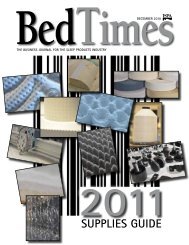You also want an ePaper? Increase the reach of your titles
YUMPU automatically turns print PDFs into web optimized ePapers that Google loves.
MediaRelations<br />
Do’s & don’ts for dealing<br />
with the media<br />
Good practices can<br />
lead to good PR<br />
By Pam Lontos<br />
As a business owner or manager,<br />
you probably know how important<br />
publicity is to the success<br />
of your company. But the truth is,<br />
many entrepreneurs, high-level executives<br />
and even marketing managers<br />
make crucial mistakes when dealing<br />
with the media. The good news is, by<br />
being aware of the more common do’s<br />
and don’ts of dealing with reporters<br />
and editors, there are many steps you<br />
can take to avoid the pitfalls.<br />
Reporters, editors and producers—<br />
whether they work for television,<br />
newspapers, Web sites, magazines or<br />
other forms of media—are deluged<br />
with requests from hopeful business<br />
owners, corporate public relations<br />
professionals and other people seeking<br />
coverage. Their days are spent<br />
meeting deadlines while doing everincreasing<br />
amounts of work, all the<br />
while constantly communicating with<br />
those publicity-seekers.<br />
If you’re ready to receive the publicity<br />
your business deserves, here are<br />
several tried-and-true ways to get the<br />
most out of your media contacts:<br />
www.sleepproducts.org/bedtimes<br />
1<br />
DON’T call the journalist and then<br />
forge ahead with whatever is on<br />
your mind.<br />
DO ask if the reporter or editor is<br />
on deadline. Journalists’ time is as<br />
important as yours and their deadline<br />
pressures are horrendous. If<br />
they are on deadline, ask for a good<br />
time to call back.<br />
2<br />
DON’T emphasize self-promotion<br />
over news.<br />
DO make sure you have valuable<br />
information to share with viewers or<br />
readers.<br />
DO give value-added tips, advice<br />
or information so that you will<br />
help improve people’s lives (i.e., the<br />
importance of sleep), offer insights<br />
(i.e., how stress interferes with<br />
sleep) or entertain (i.e., a list of odd<br />
sleeping habits). If you can achieve<br />
that goal every time, the media will<br />
make time for you and may even<br />
actively pursue you for interviews<br />
and articles.<br />
3<br />
DON’T say, “The answer is on our<br />
Web site/in our brochure/in the<br />
report” instead of giving out the information<br />
during radio, TV or print<br />
media interviews. You can point<br />
journalists to that information as a<br />
way for them to double-check facts,<br />
but provide them the Web link, brochure,<br />
etc., to make it easier.<br />
DO consider your interview as a way<br />
to show how valuable you and your<br />
ideas are. That’s the best possible<br />
advertising for your business.<br />
4<br />
DON’T ask the reporter to send you<br />
the article so you can review and<br />
approve it in advance. Most news<br />
outlets have policies prohibiting<br />
that. Prior review of every article by<br />
every person interviewed is too time<br />
consuming and would essentially<br />
halt production. Additionally, if you<br />
are one of several people being interviewed,<br />
it is generally not appropriate<br />
for you to review facts about<br />
or comments by your competitors.<br />
DO provide your contact information<br />
for follow-ups and make yourself<br />
available to clarify any confusing<br />
points or answer additional questions.<br />
Offer to help the journalist<br />
check facts or review small sections<br />
of the article for accuracy.<br />
5<br />
DON’T forget to prepare for interviews<br />
or fail to familiarize yourself<br />
with the readership or audience.<br />
DON’T assume everyone should<br />
be interested in every tiny detail of<br />
your subject just because you are.<br />
DO make sure your subject matter<br />
appeals to the target audience. If you<br />
are calling an editor at Better Homes<br />
& Gardens magazine, make sure<br />
you’re pitching an article that fits<br />
with the homey, consumer-oriented<br />
material the magazine specializes<br />
in. Read the Web sites you want to<br />
be quoted in; watch the interview<br />
shows where you want to be a guest.<br />
<strong>BedTimes</strong> | May 2009 | 59
















